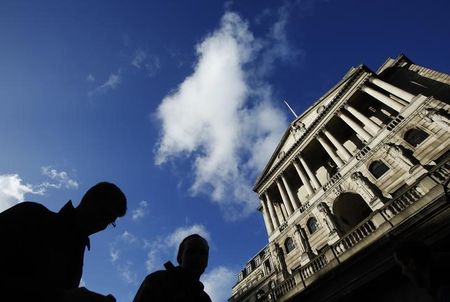By Howard Schneider
WASHINGTON (Reuters) - Global central bankers, eager to see the economy stand on its own feet, faced the rude reality this week of market turmoil threatening already faltering growth and prolonging world reliance on easy money.
Stocks slumped again on Wednesday pushing S&P 500 losses to almost 8 percent since mid-September. The dollar fell and U.S. bond prices soared after weak Chinese inflation and U.S. producer price and retail sales data fanned fears the world economy could be even weaker than thought.
When stock markets turned south last week after rallying for much of this year, many policymakers initially played that down. In fact, the sell-off could be seen bringing some healthy volatility back to markets that officials worried had become too complacent to risks ranging from tensions surrounding the conflict in Ukraine to the Ebola outbreak.
But the deepening of the sell-off may have put major central banks on their heels, by raising the prospect of the market rout going too far too fast, threatening to hurt confidence and potentially triggering a pullback in spending.
"It reminds me of the massive flight to quality we saw during the (2008) banking crisis, when there were fears that the whole global economy would tip into depression," said Nick Stamenkovic, a strategist at Edinburgh-based RIA Capital Markets.
Economists familiar with central bank policymaking say there is no doubt that officials are worried by the markets' sharp turn for the worse. It is less clear how and when will they respond.
Over the past week investors have pushed back their expected date for an initial Fed rate increase from next summer to late in 2015 or even into 2016.
Ever since the financial crisis hit six years ago, central bankers have been at the forefront of a campaign to save the global economy, slashing rates to zero and pumping trillions of dollars into the world economy via unconventional policies such as buying vast amounts of government debt.
At meetings of the International Monetary Fund last week, central bankers appeared content that their mission was largely over and called on governments to do their part to boost demand and job growth by investing in infrastructure.
FAMILIAR DILEMMA
Central bank officials from Washington to Tokyo face questions that have dogged them in recent years: Is recent volatility just a sign of markets adjusting to a host of issues, from the potential for rising interest rates to tensions in the Middle East? Or is the world economy backsliding?
Those who still have wiggle room have already been using it with central banks in Sweden, Poland and South Korea cutting interest rates over the past few days. Beijing is also expected to use its policy leeway to keep rolling out stimulus measures to keep the world's second-largest economy from cooling too much.
It is a greater challenge for the Fed, the Bank of England, the European Central Bank and the Bank of Japan, which have long hit the limits of conventional monetary policy.
Officials in Washington and London in particular were eager to start lifting interest rates in part because with rates near zero they have to resort back to unconventional policies to counter any new downturn.
San Francisco Federal Reserve President John Williams told Reuters on Tuesday that he would be open to another round of asset buying if the outlook for the economy worsened significantly. But he stressed it was a distant possibility and his main scenario was that the U.S. economy would weather global headwinds and the Fed could start lifting rates in mid-2015.
The ECB and the BOJ, meanwhile, are still in the thick of unconventional policies that are achieving only mixed results. They may be hard pressed to do more, even though ECB President Mario Draghi recently suggested it was European nations turn now to do their part saying that European governments with the capacity to borrow, such as Germany, should ramp up spending.
The Fed's policy setting committee meets Oct. 28-29 and plans to end its bond-buying program then. Its language will be watched particularly closely for evidence of how deeply recent world events have affected its thinking.
"We have seen a lot of sizeable ups and downs in recent days and we don't know where the dust will settle," said Antulio Bomfim, a former Fed economist and senior managing director at the Macroeconomic Advisers consulting firm. "I don't think this fundamentally moves the (Federal Open Market Committee) in a different direction, (but) it does throw more caution into a committee that was already cautious."

(This version of the story has been corrected to change dates of the next Fed policy setting committee meet in paragraph 16)
(Additional reporting by Paul Carrel in Frankfurt, David Milliken in London, Jonathan Spicer and Anna Yukhananov in Washington; Editing by Tomasz Janowski)
